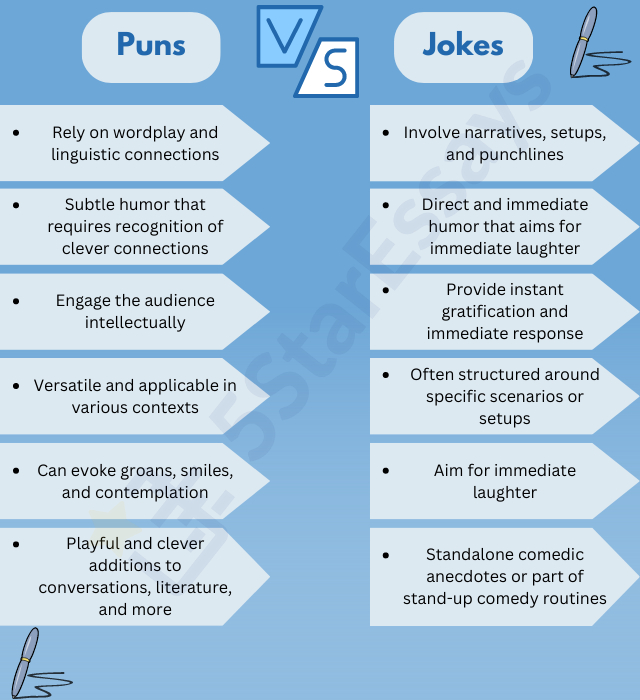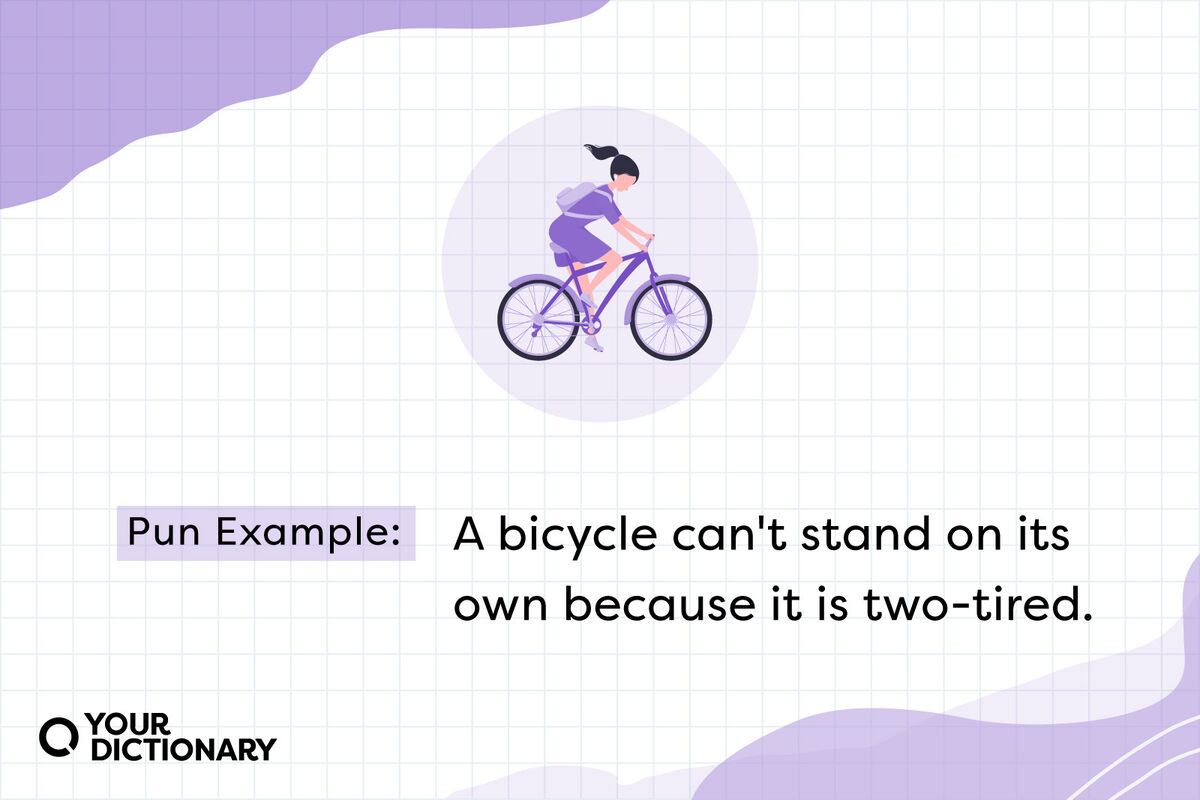Puns are witty plays on words that add humor to our daily conversations. They are clever, entertaining, and often make us think twice.
In our everyday lives, puns bring a lighthearted touch to mundane moments. They can be found in casual chats, advertisements, and even on social media. Understanding puns can make interactions more enjoyable and memorable. They offer a simple yet effective way to connect with others through humor.
Whether you are a fan of dad jokes or clever wordplay, puns have a unique charm. In this blog post, we will explore various examples of puns from everyday life. Get ready to chuckle and see the world through a more playful lens. Let’s dive into the delightful world of puns!
What Are Puns?
Puns are a form of wordplay. They use similar-sounding words or phrases with different meanings. There are two main types of puns: homophonic and homographic. Homophonic puns use words that sound alike but have different meanings, like “The duck said to the bartender, ‘Put it on my bill’.” Homographic puns use words that are spelled the same but have different meanings, like “Time flies like an arrow; fruit flies like a banana.”
Puns make us laugh. They are clever and funny. They make our brains work a little harder. Puns can make language fun. They bring joy to everyday conversations. Puns also help us connect with others. Sharing a pun can make people smile. They lighten the mood and bring humor to life.

Credit: www.5staressays.com
Puns In Conversations
People use puns in casual chats to make others laugh. For example, someone might say, “I’m reading a book about anti-gravity. It’s impossible to put down.” Such phrases add fun to regular talks. They lighten the mood and make conversations enjoyable.
Text messages also often contain puns. A friend might text, “I’m on a seafood diet. I see food and eat it.” These clever lines keep chats lively and entertaining. Puns in texts help friends feel connected and amused.
Puns In Literature
Many classic books use puns. Shakespeare loved puns. In “Romeo and Juliet,” he wrote, “Ask for me tomorrow, and you shall find me a grave man.” This pun plays on the word “grave.” It means serious and also a place for the dead. Charles Dickens also used puns. In “Oliver Twist,” Mr. Bumble says, “The law is a ass.” Here, “ass” means a donkey and a fool. These puns make the text funnier and more interesting.
Modern authors also enjoy puns. J.K. Rowling used them in “Harry Potter.” The name “Diagon Alley” sounds like “diagonally.” This pun fits the magical theme. Rick Riordan’s books have puns too. In “Percy Jackson,” there is a character named “Furty.” It sounds like “Fury,” which matches her angry nature. Puns make reading more enjoyable and engaging.

Credit: kettlefirecreative.com
Puns In Movies
Movies often use puns to make audiences laugh. For example, in “The Dark Knight,” Joker says, “Why so serious?” This line is famous. It has a double meaning. He means both serious and serious as in a serious wound. This makes the line funny and clever.
Puns add humor to movies. They make the dialogue more interesting. They can also make a scene memorable. A good pun can make audiences laugh out loud. It can lighten a serious moment. Or it can make a joke even funnier. Puns in movies can bring joy to viewers.
Puns In Tv Shows
Sitcoms often use puns to make people laugh. Friends is a great example. Chandler Bing loves to play with words. One famous pun is, “Could I BE any more sarcastic?” Another show, The Big Bang Theory, also has many puns. Sheldon Cooper makes jokes about “atom” and “a-tom”. These puns make the show funnier.
Dramas use puns too, but in a different way. House M.D. is a drama with clever puns. Dr. House says, “I am not a painkiller. I am a pain.” This pun is about his difficult personality. Grey’s Anatomy has puns related to medicine. These puns add a bit of humor to the serious scenes.

Credit: www.yourdictionary.com
Puns In Advertising
Many ads use puns to grab attention. They make people smile. A famous slogan is “Time to Re-tire” by a tire company. It’s smart and funny. Another is “We’re Better, Connected” by a telecom company. It plays with the word “connected.”
Some brands use puns in their names. One example is “Sole Mates,” a shoe store. Another is “Planet of the Grapes,” a wine shop. Puns make the names easy to remember.
Puns In Social Media
Memes are a great place for puns. They often use funny images with short, witty text. This makes them easy to share and enjoy. People love to laugh at clever wordplay. Puns make the jokes even better. For example, a picture of a cat with the text “I’m feline good” is a pun. It combines the word “feeling” with “feline” to make it funny. Memes like this are popular because they are quick and clever.
Viral posts often have puns. These posts spread fast because they are funny and smart. A good pun can make a post stand out. For example, a picture of a loaf of bread with the text “I loaf you” is a pun. It combines “love” and “loaf” for a clever twist. People enjoy these posts because they are simple and amusing. Puns in viral posts get lots of likes and shares.
Puns In Music
Many songs use puns to make us smile. “I’m so sick of love songs” by Ne-Yo has a clever twist. The word “sick” here means tired of something. Another good example is “Every Breath You Take” by The Police. The song’s title plays with the idea of watching someone closely. These puns make the lyrics more fun and memorable.
Many artists use puns in their album titles. “Abbey Road” by The Beatles is a famous one. It refers to a street in London but sounds like “a be road.” Another example is “Let It Be.” The title plays with the phrase “let it be” and the idea of letting things happen naturally. These puns make the albums stand out.
Puns In Everyday Objects
Many products use puns in their names. These names make us smile. For example, a bakery might sell “Bread Pitt” rolls. A fish market could name itself “Codfather.” Ice cream shop might call a flavor “Rocky Road.” These names are clever. They stick in our minds. They make us laugh.
Store signs often use puns too. A barber shop might say “Hair Today, Gone Tomorrow.” A pet store could have a sign “Paw-some Deals Inside.” A bookstore might display “Readiculous Prices.” These signs are fun. They attract attention. They make shopping more enjoyable.
Creating Your Own Puns
Start with a simple word. Think of other words that sound the same. Combine them in a funny way. Try to make people laugh. Use everyday objects and situations. Be clever but not too complicated. Simple puns work best.
Keep practicing. Write down your ideas. Share them with friends. See which ones get a laugh. Adjust if needed. Have fun with it!
Want to create your own puns? Here are some examples:
- Why don’t some fish play piano? They can’t find their scales.
- Time flies like an arrow. Fruit flies like a banana.
- I used to be a baker. Then I couldn’t make enough dough.
- Reading while sunbathing makes you well-red.
These are easy to create. Play with words. Enjoy the process.
Frequently Asked Questions
What Is A Pun?
A pun is a form of wordplay. It uses words with multiple meanings or similar sounds.
Why Are Puns Popular In Everyday Life?
Puns are popular because they are witty and make people laugh. They also make conversations lively.
Can You Give An Example Of A Food Pun?
Sure! “Lettuce romaine friends. ” It’s a play on “Let us remain friends. “
How Do Puns Improve Communication?
Puns make conversations fun and memorable. They help in expressing humor and creativity.
Are Puns Considered A Form Of Humor?
Yes, puns are a type of humor. They play on words to create funny meanings.
Do Puns Require A High Level Of Language Skill?
Not necessarily. Basic knowledge of words and their meanings is enough to understand and create puns.
Can Children Understand Puns?
Yes, children often enjoy puns. Simple puns can be understood by kids and make them laugh.
How Can Puns Be Used In Teaching?
Puns make learning fun. They can help students remember concepts through humor and wordplay.
Is There A Cultural Aspect To Puns?
Yes, puns can be culturally specific. Wordplay often depends on language and cultural references.
Are Puns Used In Advertising?
Yes, advertisers use puns to make slogans catchy and memorable. Puns grab attention and stick in the mind.
Conclusion
Puns add humor to everyday conversations. They make language playful and fun. Use them to brighten someone’s day. Share a clever pun with friends or family. Notice how it brings smiles and laughter. Remember, puns are all around us. Look for them in everyday situations.
Embrace the joy of wordplay. It’s a simple way to connect with others. Keep enjoying and creating puns. They make life a bit more delightful. Happy punning!


Comments